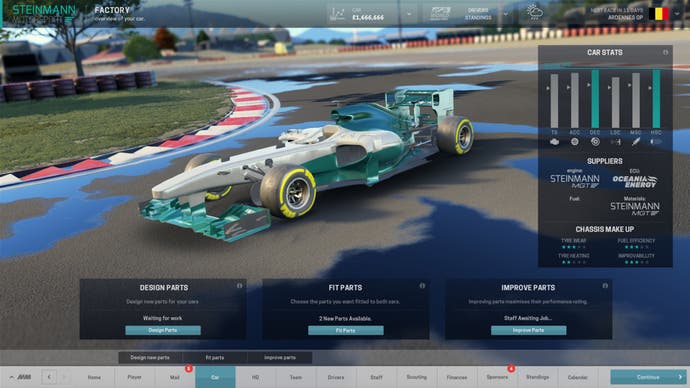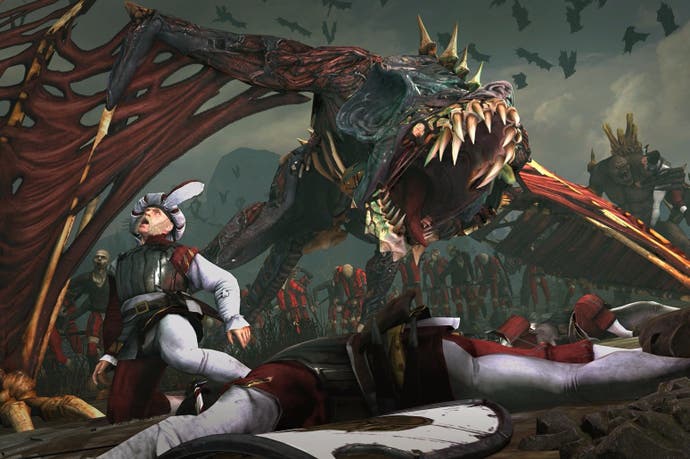Sega has quietly become one of the world's best PC strategy game companies
Sonic who?
Sega has quietly become one of the world's best strategy PC game companies.
Forget Sonic. Warhammer, football management and massive battles packed with thousands of soldiers are now Sega's speciality - particularly on western shores.
Sure, Sega's recent announcement of a couple of new Sonic games that promise a return to form for the once great blue hedgehog sparked a frenzy among the series' fans, but when it comes to people playing games right now, Sega's strategy games are doing the business.
Let's start with Creative Assembly's Total War series. Creative Assembly, based in Horsham in the UK, has enjoyed massive success, particularly in Europe, with its big army strategy PC games. It recently released Total War: Warhammer, which has gone down well with players and enjoys a healthy player base on Steam. I know Chris loves it, despite the fact it's not called Total Warhammer.
At the time of publication, over 8000 people were playing Total War: Warhammer on Steam. But that doesn't paint the whole picture of the series' continued popularity. I count six Total War games currently in Steam's top 100 most-played games list, each enjoying over 1000 concurrent players. The Total War series has certainly had its ups and downs (Total War: Rome 2 didn't go down well at all), but that's an impressive return.
As part of its financial results released this week, Sega said the Total War series had shifted more than 20m copies during its 16 years of existence. Not bad for what is, essentially, a hardcore PC strategy series. Total War: Warhammer, it said, had performed strongly.
Sega has another PC strategy game that continues to perform superbly on Steam: Football Manager. The latest entry in Sports Interactive's ongoing annual franchise, Football Manager 2016, is pretty much always in Steam's top-10 games by current player count list. At the time of publication, it had an impressive 24,305 people playing.
Outside of the UK, Sega owns other strategy specialist studios. Sega bought Relic Entertainment, based in Vancouver, Canada, after previous owner THQ went bust, and it helped World War 2 real-time strategy PC game Companies of Heroes 2 through launch and post launch.
While Company of Heroes 2 doesn't enjoy the same number of players as the likes of the latest Total War and Football Manager games, continued support from Relic has kept a sizeable and loyal audience interested. At the time of publication, 2522 were playing Company of Heroes 2 on Steam.
Relic, as we know, is beavering away on Warhammer 40,000: Dawn of War 3, the next entry in the sci-fi RTS series. Based on what I've seen of it, Dawn of War 3 looks good.
Even Sega's Japan-made strategy games have enjoyed huge success on Steam. When Sega finally released much-loved PlayStation 3 strategy game Valkyria Chronicles on PC, back in November 2014, it shot up to the top of Steam's best-sellers list, selling more than the likes of Assassin's Creed: Unity.
You can see Sega's taking notice of its success on PC, and is on the hunt for more strategy specialists. It just bought Amplitude, developer of the brilliant Endless franchise, at it looks to cement its position as a strategy powerhouse. It's even publishing Motorsport Manager, from little-known Playsport Games.
It all amounts to a quiet transformation for Sega, which retains an image of being a console game maker in the hearts and minds of many who grew up with the likes of Sonic and the Mega Drive. Sega is not this company any more. The truth is, it hasn't been for a long time.

In Japan things are very different, of course. Total War and Warhammer aren't a big deal there, as you'd expect. In Japan, Sega focuses on the likes of Phantasy Star Online 2 for PS4 (criminally, still not out in the west), arcade and casino machines, and pachinko. Sega isn't just Sega. Sega is Sega Sammy. There's a lot going on.
And the acquisition of Japanese game company Atlus, maker of the Persona series of games, seems set to have little impact on Sega's business in Europe. Here, Saints Row maker Deep Silver, not Sega, will publish Atlus' games as boxed products on shop shelves.
Really, Sega doesn't do physical games in Europe any more. Creative Assembly's wonderful PC and console horror game Alien: Isolation was a hit with critics and players, but it failed to sell enough copies to secure an immediate sequel. Now, Sega has left discs behind and turned to Steam, where it's carved out a reputation as something of a digital PC specialist. Look how well Mega Drive classics have gone down on Steam, where Sega has done well to support modders. It's a refreshingly PC community-focused approach from a Japanese game company. We're not used to seeing that.
Sure, new games in the Sonic and Yakuza series will come out on the likes of the PS4 and Xbox One, but Steam is the company's current platform of choice in the west. And it is hardcore strategy that's leading the charge.



